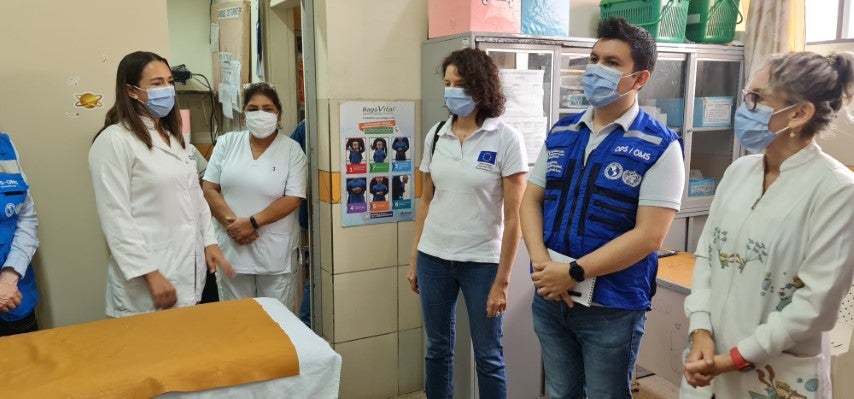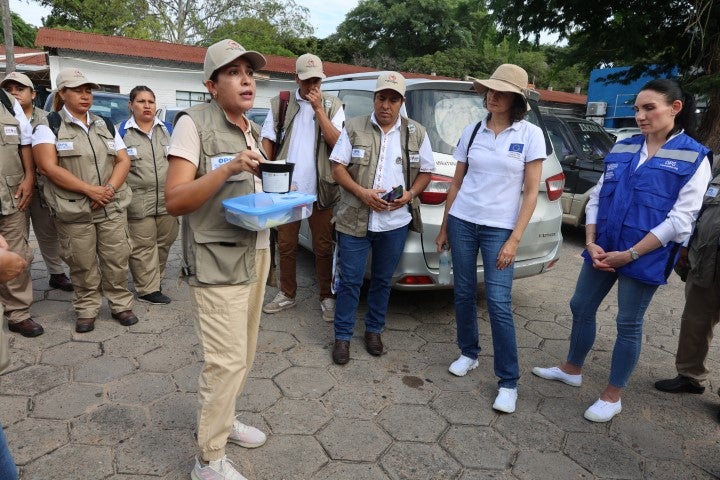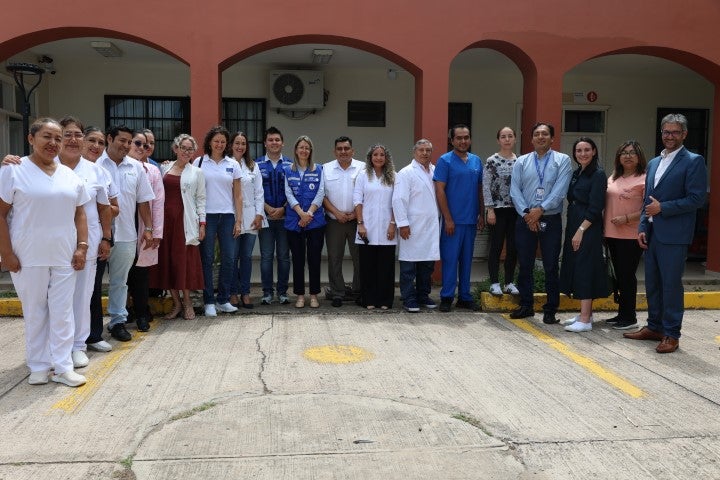
Santa Cruz de la Sierra, Bolivia, March 27, 2025 (PAHO) – Following a historic epidemic year in the Americas in 2024, Bolivia has bolstered its emergency response capabilities for dengue outbreaks thanks to financial support from the Directorate-General for European Civil Protection and Humanitarian Aid Operations (DG ECHO). Key actions implemented include the establishment of a network of clinical leaders in endemic municipalities, improved laboratory diagnostics through the provision of essential supplies and epidemiological surveillance, as well as the strengthening of the entomology laboratory network with supplies, training, and the implementation of an ovitrap surveillance system in prioritized municipalities.
These advancements were presented to a technical mission with delegates from the European Union by the Ministry of Health and Sports, through the National Arbovirus Program, the Departmental Health Services (SEDES), the National Center for Tropical Diseases (CENETROP) - the national reference laboratory -, and the Pan American Health Organization (PAHO). These efforts were made in response to the current dengue outbreak emergency.
Joelle Van Winghem, regional health technical expert for DG ECHO in the Americas, arrived in Bolivia to assess the progress in implementing the response to the multi-country dengue outbreak in Central and South America, of which Bolivia is a part. Dr. Van Winghem was accompanied by regional experts from PAHO's health emergencies and communicable diseases departments - Julie Mauvernay, Diego Campos, Cristina Maña - and María Jesús Sánchez, PAHO's international advisor on Communicable Diseases in Bolivia.
During the visit to Santa Cruz de la Sierra, the mission reviewed the progress, achievements, and challenges in key aspects of integrated dengue and other arboviral disease management, focusing on the clinical management of suspected dengue cases at all levels of care, epidemiological and laboratory surveillance, risk communication, social mobilization, and community engagement, along with integrated vector control measures.
To evaluate the impact of the clinical leaders' network and the replicated training in health facilities, visits were made to the 2nd level Hospital Francés and the 1st level Santa Rosita Health Center. Dr. Eliana Vega, an internist and regional expert at Hospital Francés, highlighted the importance of the clinical network in standardizing protocols and organizing services, emphasizing its impact on reducing dengue mortality.
The clinical network, comprising 292 leaders in 84 endemic municipalities, collaborates with health network coordinations and develops local training plans to strengthen health personnel. Additionally, under the leadership of the Ministry of Health and Sports, it reviews and adjusts the National Clinical Management Guide for Arboviruses.
The mission also verified the strengthening of CENETROP, which has improved its diagnostic capacity through supplies and equipment donated by PAHO and funded by the European Union, and has initiated a plan to decentralize diagnostics with dengue serology laboratories in identified health centers. Progress in entomological surveillance using ovitraps and the development of operational plans for vector control in prioritized municipalities were also evaluated. As part of this review, District 4 of Santa Cruz de la Sierra was visited to observe the implementation of entomological surveillance.
The implemented actions also included training in the use of motorized backpack sprayers and efficacy testing of fogging machines in Santa Cruz, as well as the development and validation of the National Entomological Surveillance Guide for Aedes aegypti, among others.
The response actions to the exceptional dengue situation in Bolivia, funded by the European Union with technical support from PAHO, achieved extensive inter-institutional coordination with public implementing actors and facilitated a high-level meeting of 19 municipalities to consolidate commitment to the Integrated Dengue Management Strategy (EGI). This meeting included mayors and health officials who reaffirmed their commitment to implementing dengue prevention and control actions in endemic municipalities.
The implemented strategies have contributed to better preparedness of health services through the application of differential diagnosis, appropriate clinical management, reorganization of emergency care, and availability of supplies to provide timely care to dengue patients. First-level health facilities are now capable of properly triaging patients, attending to lower-risk cases, and referring patients to reference hospitals only in severe cases, thus reducing the demand burden on reference hospitals.
The acquisition of equipment and supplies, diagnostic training, and decentralization of dengue test processing to first-level health facilities will enable timely detection of dengue cases.
The mission concluded with an exchange of perspectives on the achievements, remaining challenges, and opportunities for improvement in the response to dengue emergencies, highlighting the importance of investing in prevention and emergency response for this disease and other climate-sensitive communicable diseases.






